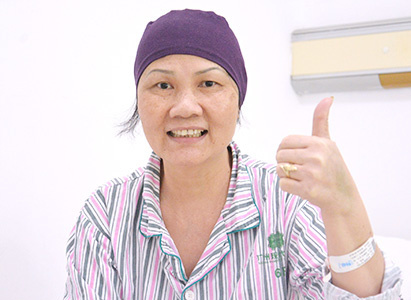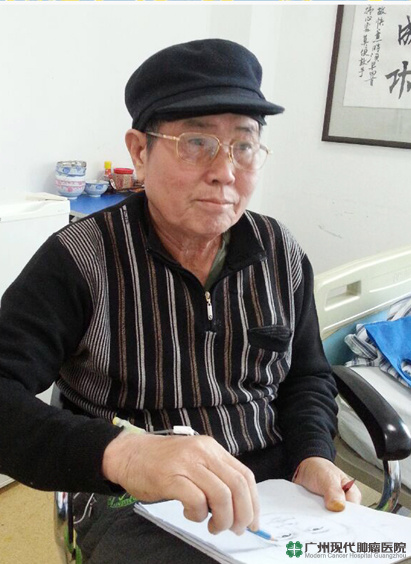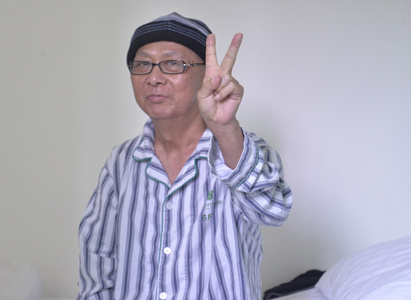According to statistics, lung cancer is one of the most common cancers with high mortality rate. In the world, every 30 seconds, one person will die of lung cancer; and there are 1.2 million new cases each year.
The number of new cases of lung and bronchus cancer was 60.1 per 100,000 men and women per year. The number of deaths was 49.5 per 100,000 men and women per year. These rates are age-adjusted and based on 2007-2011 cases and 2006-2010 deaths.
For example, in Malaysia, lung cancer is the 2nd most common cancer affecting men and 3rd most common cancer with 2,100 Malaysians diagnosed each year.

Through surgery, the lung tumor is removed, but the partial or entire lung is also removed, which weakens patients’ respiratory function. Statistics show that after removal of entire unilateral lung, about 10.7% of patients will die within 30 days; and if the observation period is extended to one year, the mortality rate will be higher. Among the survivors, many of them will have the symptoms of dyspnea.
Lung cancer dose not cause any symptoms until they have spread too far to be cured, but symptoms do occur in some people with early lung cancer. If you go to your doctor as soon as you notice symptoms, your cancer might be diagnosed at an earlier stage, when treatment is more likely to be effective.

1. Coughing, especially if it persists or becomes intense
2. Pain in the chest, shoulder, or back unrelated to pain from coughing
3. A change in color or volume of sputum
4. Shortness of breath
5. Changes in the voice or being hoarse
6. Harsh sounds with each breath (stridor)
7. Recurrent lung problems, such as bronchitis or pneumonia
8. Coughing up phlegm or mucus, especially if it is tinged with blood
9. Coughing up blood
If the original lung cancer has spread, a person may feel symptoms in other places in the body. Common places for lung cancer to spread include other parts of the lungs, lymph nodes, bones, brain, liver, and adrenal glands.

Surgical excision remains the traditional therapy of lung cancer. In the chest, about 30-40 centimeters surgical wound will appear; and even one or two ribs needs to be relieved, which makes the chest be completely exposed to remove the tumor. Experienced such torture, tumor is removed, but many patients will have complications or other induced diseases, which seriously affect patients’ life and work.

Chemotherapy and radiotherapy utilize drugs or radiation to kill cancer cells, but also damage other normal cells. Therefore, patients will have severe toxicity, low immunity. Moreover, the fragile body cannot resist the invasion of cancer and other diseases, so that patients also face the threat of death.

Recently, with the development of minimally invasive treatment for cancer, cryosurgery therapy, partical knife, interventional therapy and other minimally invasive technologies of treatment have brought good therapeutic effects to cancer patients. Since 2007, chief expert Peng Xiaochi has led the multidisciplinary team to explore the minimally invasive therapies of thoracic surgery field. Multidisciplinary team of experts applies modern imaging technology to the operation with 1-2 mm incision. Until now, Modern Cancer Hospital, Guangzhou has completed several thousand cases of minimally invasive treatment.

Chinese medicine can adjust the overall balance of internal environment, which can strengthen the resistance to disease and restrain the development of tumor. In this way, patients will not have discomfort reaction. Besides, Chinese medicine can improve and consolidate the effects of cryosurgery therapy, partical knife, and interventional therapy, which can improve quality of life and prolong life.
Ar-He knife is a kind of cryotherapy. Revolutionary breakthrough of Ar-He knife lies in its unique system of rapid argon cooling and helium heating. Helium can freeze tumor tissue into ice ball and kill tumor cells within a minute while it will cause no damage to normal tissue. Rapidly increased temperature is obtained after freezing procedure followed by a second rapid freezing. Such reversal process of freezing could thoroughly destroy tumor and cause dehydration and rupture or lead to oxygen deficiency due to damaged small vessels of tumor and to death of cancer cell. Meanwhile, the dead tumor tissue remaining at the original site after freezing ablation could regulate tumor antigen levels and activate anti-tumor/cancer immune response. Hence, Ar-He knife is characteristic of one therapy, two approaches and three effects.[If any questions, please contact us.]




Modern Cancer Hospital Guangzhou is a comprehensive modern hospital specializing in oncotherapy and operating under the auspices of the Chinese government and Ministry of Health. The rapid development of China has attracted attention from all over the world. Chinese medical treatment has been one of the beneficiaries of this development, with Modern Hospital Guangzhou as a model 21st century health care facility... [Read More]
